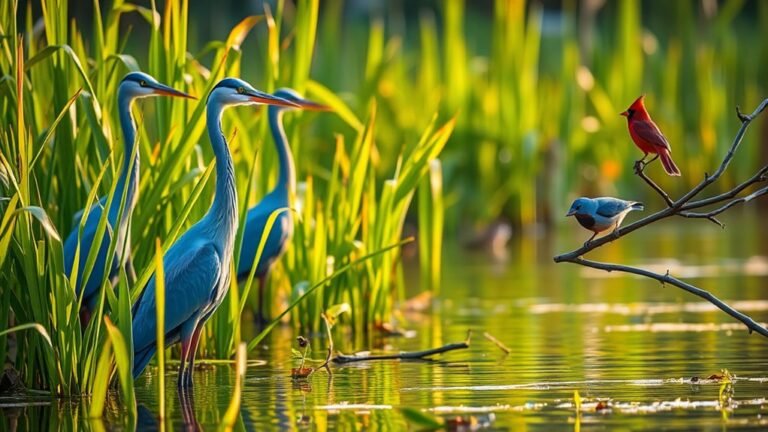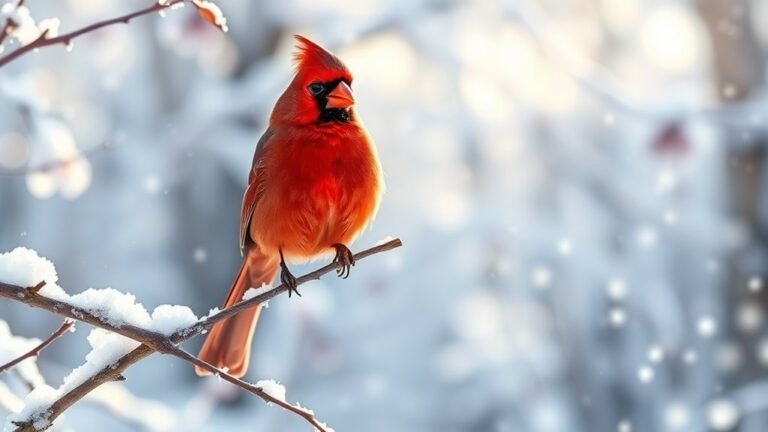Birds That Vocalize at Night in Summer Massachusetts: Local Insights
As night falls in Massachusetts, a variety of birds begin to call. The Eastern Whip-poor-will makes a loud, clear sound, while the Common Nighthawk sings softly in the dark. These calls add to the nighttime atmosphere and tell us about the birds' behaviors.
Birds vocalize at night for several reasons. They communicate with each other to find mates or mark territory. These sounds also help them navigate their surroundings in the dark. Understanding why these birds sing at night gives us insight into their roles in the local ecosystem.
Listening to their calls can be a relaxing and enjoyable experience. It connects us to nature and reminds us of the vibrant life around us, even under the cover of darkness.
Key Takeaways
- The Eastern Whip-poor-will is known for its clear call, signaling summer nights in Massachusetts.
- Nightjars are hard to spot but create unique sounds and blend well with the forest floor.
- Barn Owls fly quietly at night. They use soft calls and sharp senses to find their way in the dark.
- Common Nighthawks make sad calls, adding to the calm feel of summer evenings while catching insects in flight.
- Barred Owls and Screech Owls call out during summer nights with loud hoots and spooky sounds, enhancing the local noise.
The Enigmatic Eastern Whip-poor-will: A Nighttime Icon
As the sun sets, you may hear the call of the Eastern Whip-poor-will. This bird is a symbol of summer nights. Its "whip-poor-will" cry fills the air, creating an atmosphere people enjoy during evening gatherings.
Whip-poor-wills are most active at dusk and dawn. They use their calls to mark their territory and attract mates.
These birds nest at night in hidden spots among bushes, where their camouflaged feathers make them hard to see.
Hearing the whip-poor-will reminds us of nature's balance. These birds add to our summer nights, creating a rich soundscape under the stars.
Nightjars: Masters of Camouflage and Sound
The Eastern Whip-poor-will is a well-known nighttime singer, but nightjars also contribute to the sounds of the night.
Nightjars have unique calls that create a captivating atmosphere in the woods. Their excellent camouflage allows them to blend into the forest floor, making them hard to spot. This difficulty adds excitement for those aiming to see them.
As you look for nightjars, listen for the soft, haunting sounds that fill the air at night. Learning about their behavior can help you connect with these elusive birds and enhance your summer nights in Massachusetts.
Enjoy the mystery—discovering these hidden creatures makes nighttime adventures rewarding.
Barn Owls: Silent Predators in the Moonlight
Barn Owls are effective hunters that come out during the night. They fly quietly, which helps them catch their prey without being heard.
Their hearing and vision are sharp, allowing them to locate food easily in the dark. As they glide, their wings make little noise, creating a thrilling hunting experience. Sometimes, you might hear their soft calls, reminding you of their presence.
Watching these beautiful birds gives a unique feeling of connection to the night. This experience adds to the magic of summer evenings in Massachusetts.
The Melancholic Call of the Common Nighthawk
The Common Nighthawk calls softly on summer nights. This sound fills the air, creating a sense of longing and connection. You can hear it from roofs or fields, adding to the peaceful atmosphere.
Each year, these birds migrate from faraway winter homes, showing their bond to the land. Watch them glide through the night as they catch insects in the moonlight. This feeding ritual brings a sense of comfort to your summer evenings.
The presence of the nighthawk invites you to connect with nature and enjoy the stories carried by the breeze on these magical nights.
Barred Owls: The Forest's Deep-Voiced Sentinels
As night falls, the clear hoots of Barred Owls fill the forests, creating a unique soundscape in the summer. Their calls mark their territory and communicate with others.
Observing their movements shows how they fly quietly between trees, skillfully hunting for food. Barred Owls use their sharp eyesight and strong hearing to catch small mammals and birds in the dark.
Their brown-and-white feathers help them blend into the forest, making them fascinating but hard to spot. Listening to their calls and watching their behavior helps you connect with the lively night environment, highlighting the forest's role as a rich ecosystem.
The Haunting Sounds of Screech Owls
The night air often carries the soft sounds of the forest, but the calls of Screech Owls stand out. These small birds use unique sounds to communicate in the dark. You can hear their eerie whinnies and trills as they mark their territory.
As skilled nocturnal hunters, Screech Owls depend on sharp hearing and sight to catch insects and small mammals at night. Watching them can feel both mysterious and familiar, as their calls blend into the night, reminding us that nature has its own way of speaking.
Carolina Wrens: Daytime Singers Turned Nighttime Serenaders
Carolina Wrens sing during the day and continue their songs at night. This creates a lovely serenade under the moonlight. These small, active birds fill the air with cheerful calls while they search for food.
As the sun sets, their breeding instincts lead them to vocalize. They assert their presence to potential mates and mark their territory. Their rich, melodic notes fill the warm summer air, creating a feeling of community.
During this nighttime concert, you feel a connection to nature. Whether you're on an evening walk or relaxing in your backyard, Carolina Wrens invite you to pause and enjoy their charming nocturnal performance.
The Unique Behavior of Nocturnal Songbirds
Nocturnal songbirds display unique behaviors that differentiate them from daytime birds. They've special adaptations that help them thrive during the night.
Their songs are rich and melodic, serving purposes like marking territory and attracting mates in summer. These birds are more alert at night, using their sharp senses to move in low light.
Unlike daytime singers, nocturnal songbirds sing sporadically, creating enchanting sounds that fill the quiet night. Watching their actions provides insight into their fascinating world, where their songs blend beautifully with summer nights.
Understanding the Ecosystem Role of Night Vocalists
The chorus of night vocalists is important for balancing ecosystems.
During summer nights, their calls help signal territory, attract mates, and alert others to predators. These interactions shape nighttime behaviors and influence other species.
By listening carefully, you can hear how these vocalizations connect various forms of nocturnal life. They also deepen your sense of belonging to nature, sparking curiosity about these hidden lives.
Understanding these night singers enhances your connection to the environment and increases your appreciation for the delicate balances that support life under the stars.
Frequently Asked Questions
What Time of Night Do These Birds Typically Vocalize?
These birds usually sing from dusk until dawn. Their vocalizations highlight their active nighttime behavior. In summer, their calls become more pronounced, creating a lovely soundscape that brings you closer to nature.
How Can I Attract These Nocturnal Birds to My Yard?
To attract nocturnal birds to your yard, place feeders near soft, dim lights. Watch where they go; they prefer quiet areas with little disturbance. By making these simple changes, your yard can become a welcoming space for these night visitors. Enjoy the beauty of watching these interesting birds come to your home.
Do These Birds Vocalize Year-Round or Only During Summer?
These birds mostly sing during warm months. Their singing drops off in cooler weather. As temperatures fall, you may hear fewer calls at night. This creates a changing sound environment.
Are Night Vocalizing Birds Affected by Urban Noise?
Night vocalizing birds often struggle with sound communication due to urban noise. In cities, they adapt by changing their calls and behaviors to survive. These adjustments help them thrive despite the loud environment. Observing these birds can reveal how they cope with challenges and continue their vocalizations in bustling settings.
How Do Nighttime Temperatures Influence Bird Vocalizations?
Nighttime temperatures influence bird vocalizations and their nighttime activities. Warmer nights lead to increased singing. Birds express their presence and connect with their environment through these vocalizations. Cooler nights may reduce singing frequency, as birds tend to be less active. Understanding these patterns helps us appreciate how temperature impacts bird behavior.

Ava is a bird enthusiast and nature lover who has spent countless hours observing and learning about the fascinating world of birds. With a passion for sharing her knowledge and inspiring others to appreciate the beauty of birds, Ava writes about her experiences and insights on avianadmirer.com.







